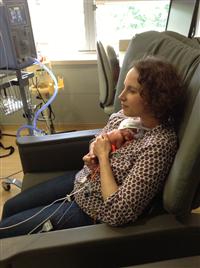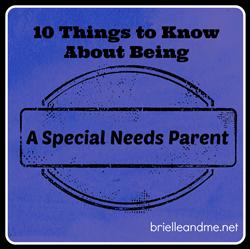How To Help NICU Parents ~ Ideas from a Micro-Preemie Mom
By Lisa Tandan, author of the blog Alannah Annabelle: A micro-preemie adventure
I have always considered myself to be ordinary. I assume that if something, whether good or bad, happens to a small number of people, I won’t be among them. I don’t expect to be in a plane crash, nor to win the lottery. As it happens, however, last year I managed to both crash and hit the jackpot.
Last May, following an uneventful 24 weeks of pregnancy, I found myself in the antepartum unit at Forsyth Medical Center. Then, 12 days into my hospital bed rest,my daughter was born, at 26 weeks and 3 days gestation, weighing only 1lb 12oz (790 grams) and 12 inches in length.
 For the next 73 days, our journey was measured in grams gained or lost, milliliters eaten, body temperatures, blood transfusions (three), liters of oxygen, central lines, IVs in every limb and even the head, heel pricks for blood gases, and ‘episodes,’ which are NICU slang for apnea (not breathing), bradycardia (heart slowing), and desaturation (low blood oxygen). Episodes occurred multiple times a day, and sometimes required intervention from the nurses. Every day we heard a barrage of alarms – some minor, some critical – as we sat with our little girl. When I first held my daughter, I could easily fit her between my chin and my bra. She was the smallest human I had ever seen.
For the next 73 days, our journey was measured in grams gained or lost, milliliters eaten, body temperatures, blood transfusions (three), liters of oxygen, central lines, IVs in every limb and even the head, heel pricks for blood gases, and ‘episodes,’ which are NICU slang for apnea (not breathing), bradycardia (heart slowing), and desaturation (low blood oxygen). Episodes occurred multiple times a day, and sometimes required intervention from the nurses. Every day we heard a barrage of alarms – some minor, some critical – as we sat with our little girl. When I first held my daughter, I could easily fit her between my chin and my bra. She was the smallest human I had ever seen.
It was long. It was terrifying. I can’t adequately convey what it is like to watch your baby in an isolette knowing that you can’t keep her safe. That you’ll never hold her as a plump, healthy newborn. To put your trust in people you’ve never met to care for the most important person in the whole world to you. To wonder if you’ll bring your baby home, not when.
Alannah’s unexpected, extremely early birth was our crash and it will always be with us. But here’s where we hit the jackpot: this child is amazing.
 I know, everyone’s child is amazing and I’d still feel the same if I hadn’t witnessed what she’s overcome. However, Alannah is resilient in a way I never imagined. She’s spirited and determined. Other than her small size, she doesn’t show that she spent her first few months in a hospital with alarms and bright lights, instead of developing in the quiet comfort of her mother. According to national statistics, only 35% of babies born before 27 weeks reach age 3 without a disability. Even if she doesn’t remain among that 35%, I will always feel she is incredible, because I’ve seen what she has overcome. I had always been too much of a cynic to have a hero, but now I do. My daughter is my hero. (Alannah at 3 months pictured above left, and pictured below at almost one year)
I know, everyone’s child is amazing and I’d still feel the same if I hadn’t witnessed what she’s overcome. However, Alannah is resilient in a way I never imagined. She’s spirited and determined. Other than her small size, she doesn’t show that she spent her first few months in a hospital with alarms and bright lights, instead of developing in the quiet comfort of her mother. According to national statistics, only 35% of babies born before 27 weeks reach age 3 without a disability. Even if she doesn’t remain among that 35%, I will always feel she is incredible, because I’ve seen what she has overcome. I had always been too much of a cynic to have a hero, but now I do. My daughter is my hero. (Alannah at 3 months pictured above left, and pictured below at almost one year)
Since Alannah’s NICU stay (which was shorter than that of most micro-preemies, many micro parents endure the NICU for well over 100 days), I’ve been asked by friends and family who know other NICU moms what the best ways that they can help are. Here are a few helpful hints:
 1. Reach out!
1. Reach out!
Every message, call, and text meant so much to me, but I couldn’t respond to each one. When you contact a mom, understand that she may not get back to you (no phone calls allowed in the NICU). You can offer to update a blog or CaringBridge site for the family, so they only have to give an update once and it will reach everyone. If you are considering whether or not to get in touch, because you know they are busy and have a lot going on, remember that silence can be very loud.
2. Watch what you say.
Having a baby in the NICU is a sensitive, sad situation. You may be tempted to try to find the silver lining for the NICU mom. Don’t. Instead, review this list of things not to say, and know that the best thing you can do is listen.
3. Offer to help by doing or giving something specific, instead of asking “What do you need?”
Here are some of the things I, and others, have found most helpful: a hospital care package with items like hand lotion and magazines, gift cards for apps for mobile devices, meals or gift cards to nearby restaurants or the hospital cafeteria, house cleaning, lawn care, babysitting for older children, gift cards for gas and travel-related expenses, pumping supplies (verify first if the mom is pumping), setting up the nursery, and arranging a shower. Don’t assume that just because the new parents don’t have a newborn at home, they have plenty of time and sleep: I was almost never at home, and when I was, I did not want to waste my time on menial tasks that no longer felt important.
4. Take the stigma out of counseling.
The NICU can be a trauma for any parent. For a parent facing the long haul, the trauma drags on for what feels like forever. It is totally normal for a typical mom to experience postpartum blues or depression. It is even more common for a mom to experience this with a traumatic birth and a NICU stay – of almost any length. Counseling is healthy outlet that should be encouraged; it’s a wonderful place to hash out everything, re-energize and find your balance.
5. Finally, Capturing Hopes is an incredible nonprofit in the Triad that provides free professional photography to parents in the NICU.
Let her know about this resource. The sessions are short about 10-15 minutes, so they don’t take time away from you and your baby, and the photos are amazing. At the time, I had no idea how important they would be to me. Looking back, one year later, I will treasure them forever.
If you can relate, please share your suggestions for parenting helping NICU families too!







